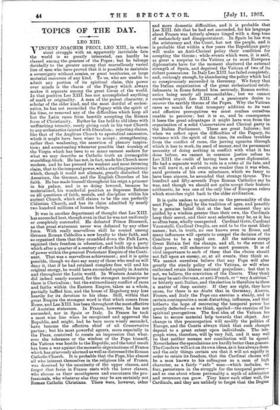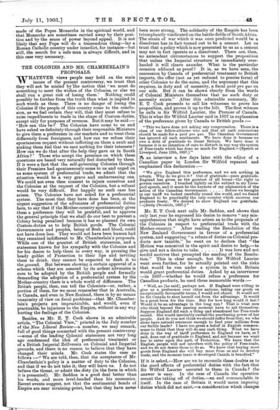TOPICS OF THE DAY.
LEO XIII.
VINCENT JOACHIM PECCI, LEO XIII., in whose stout struggle with an apparently inevitable fate the world is so greatly interested, can hardly be classed among the greatest of the Popes ; but he belongs decidedly to the greater among that marvellously varied line of men who have proved that it is possible to maintain a sovereignty without armies, or great territories, or large material resources of any kind. To us, who are unable to admit any portion of its spiritual claim, this power over minds is the charm of the Papacy which always .makes it separate among the great forces of the world. In that position Leo XIII. has not accomplished anything of mark or originality. A man of the purest character, a scholar of the older kind, and the most dutiful of ecclesi- astics, he has not reconciled the Papacy with the spirit of his lime, or removed any of the difficulties which keep all but the Latin races from heartily accepting the Roman form -of Christianity. Rather he has held to' old ideas with unflinching tenacity, rarely giving rank in his vast Church to any ecclesiastics tainted with liberalism; rejecting claims, like that of the Anglican Church to apostolical succession, which it might have been wiser to accept ; strengthening, rather than weakening, the assertion of plenary inspirit- tioni and accentuating whenever possible that worship of the Virgin which has been to so many earnest seekers for what we may describe as Catholic truth an irremovable stumbling-block. He has not, in fact, made his Church more modern, and he has pressed its weakest and most fettering claim, that to the temporal power, with a startling persistency which, though it could not alienate, greatly disturbed the American, the German, and the English Churches of his faith. • He has made himself throughout his reign a prisoner iu his palace, and in so doing lowered, because he materialised, his wonderful position as Supreme Referee on all questions of faith, morals, and discipline within his ancient Church, which still claims to be the one perfectly Clitiatian Church, and has its claim admitted by nearly two hundred millions of human beings.
It was in another department of thought that Leo XIII. has succeeded best, though even in that he was not uniformly or completely successful. He defeated Prince Bismarck, as. that great statesman never was defeated by any other force. : With really marvellous skill- he roused among German Roman Catholics a new loyalty to their faith, and so' organised them that they crumbled down the Falk Laws, regained their freedom in education, and built up a party which after a quarter of a century of effort holds the balance of power within the greatest Protestant Empire of the Conti- nent. That was a marvellous achievement ; and it 'is quite possible, though we dare say many of those who read us will deny it, that if he had retained complete free will and his original energy, he would have succeeded equally in Austria and throughout the Latin world. In Western Austria he did indeed nearly succeed, for the strongest motive-power there is Clericalism ; but the extraordinary conflict of races and faiths within the Eastern Empire, taken as a whole, partially baffled him, and the house of Hapsburg may lose heavily for its devotion to his ideas. Still, within that great Empire the strongest word is that which comes from Rome, and Leo XIII. has been throughout the most effective of 'Austrian statesmen. In France, however, 'he has not succeeded, nor in Spain or Italy. In France he took a most wise line when he recognised and approved the Republic, and might, had he been more wisely seconded, 'have become the effective chief of all Conservative parties ; but his most powerful agents, more especially in the Press, contrived to create an impression that what- ever the tolerance or the wisdom of the Pope himself, the Vatican was hostile to the Republic, and the total result has been a war against the monastic Organisations of. France which has grievously alarmed as well as distressed the Roman Catholic Church. It is probable that the Pope, like almost all who interest themselves in the religious life of France, was deceived by the unanimity of the upper classes, and forgot. that force in France rests with the lower classes, who choose as their mouthpieces and executants the pro- fessionals, who whatever else they may be are certainly not Roman Catholic Christians. There were, however, other and more domestic difficulties, and it is probable -that Leo XIII. felt that he had not, succeeded, for his language about France was latterly always tinged with a deep tone of melancholy and disappointment. . In Spain lie has won the aristocracy and the Court, but not the people, and it is probable that within a few years the Republican party will make an Anti-Clerical policy their condition for accepting the throne ; while events which were, it is said, as great a surprise to the Vatican as to most EurOpean diplomatists have for the moment shattered the external strength of Spain, and deprived the Vatican of two of its richest possessions. In Italy Leo XIII. has failed completely, and, curiously enough, by abandoning the policy which had so conspicuously succeeded in Germany. We fancy that the Italian organisation or the great ecclesiastical estab- lishments in Rome fettered him seriously, Roman ecclesi- astics being nearly all irreconcilables ; but we cannot ourselves acquit Leo XIII. of a passionate desire to recover the earthly throne of the Popes. Why the Vatican cares so much for that trumpery addition to- its 'vast and effective prerogatives we must confess ourselves unable to perceive ; but it- is so, -and In • consequence it loses the great advantages it might have won from the organisation of a solid Conservative and Clerical party in the Italian Parliament. These are great failures but when we reflect upon the difficulties of the Papacy, its variance with the spirit of the time, its endless troubles from the conflict of races, the jarring agencies through which it has to work, its need of money, and its permanent necessity of doing nothing in conflict with what it has done before, we cannot in common justice refuse to Leo XIII. the credit of having been a great diplomatist. He had a separate world to rule in a crisis of its fate, and he will leave it, at all events, no weaker than it was when, amid protests of his own reluctance, which we fancy to have been sincere, he ascended that strange throne. Two hundred and fifty-seventh Pope Roman Catholics say ho was, and though we should not quite accept their historic arithmetic, he was one of the only line of European rulers which stretches right back to the older civilisation.
It is quite useless to speculate on the personality of the next Pope. Helped by the tradition of ages, and possibly by a genuine belief that at the last moment they are guided by a wisdom greater than their own, the Cardinals keep their secret, and their next selection may be, as it has so often been, wholly unexpected. Cardinal Gotti, Cardinal Vannutelli, Cardinal Oreglia, are said to be the most likely names but, in truth, no one knows even in Rome, and many influences will operate to compel the decision of the Conclave to be a rapid one. All the nations except Great Britain feel the change, and all, to the extent of their power, will endeavour to exert pressure. It is of vital importance to each of them that the choice should not fall upon an enemy, or. at all events, they think so. We cannot ourselves believe that any Pope will alter greatly the steady policy of the Vatican, or will- when enthroned retain intense national prejudices ; but that is not, we believe, the conviction of the Courts. They think he may be anti-German, or anti-French, or " very Austrian," or bitterly anti-Italian, and the election is' theiefcire fe them a matter of deep anxiety. If they are right, they-have cause, for there is no doubt that in Germany; Austria, France, and Italy the Pope'can exercise a steady, and in certain contingencies a most disturbing, influence, and that hitherto the hope of recovering the teniporal power has greatly deflected—as we think, spoiled—the exercise 'of his spiritual prerogatives. The first idea of the Vatican has been to secure material help towards that object. Any change in this preoccupation will modify the polities of Europe, and the Courts always think that such changes depend to a great extent upon individuals. The tele- graph wires, therefore, will lie very full, and it may well be that neither menace nor conciliation will be spared. Nevertheless the speculations are hardly bettor than guesses. The Conclave will act on its own ideas, as it has always done, and the only things certain are that it will act rapidly in order to retain its freedom, that the Cardinal chosen will .be a man known to his colleagues as a man of •high character, as a fairly " safe " man—which includes, we fear, persistence iu the struggle for the temporal power— and as one about whose personality a myth of admiration and reverence can grow. They know each other well, the Cardinals, and they are unlikely to forget that. the Dogma made of the Popes Monarchs in the spiritual world, and that Monarchs are sometimes carried away by their posi- tion and by the sense of power beyond appeal. It is not likely that any Pope will do a tremendous thing—lay a Roman Catholic country under interdict, for instance—but still, the search -for a safe man is always difficult, and in this case very necessary.







































 Previous page
Previous page